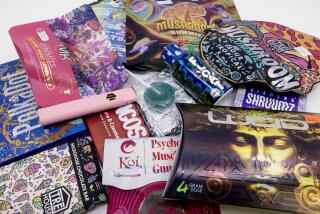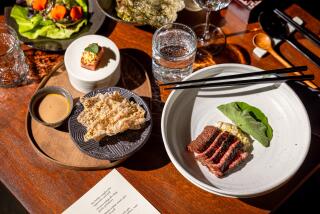New Study on ‘Chinese Restaurant Syndrome’
- Share via
Countless Chinese and Japanese restaurants have been questioned about and, at times, criticized for continuing to use monosodium glutamate, or MSG, as an ingredient even though the seasoning is suspected of causing allergic reactions in those sensitive to the substance.
Patrons’ growing concerns over possible health problems and the flavor enhancer’s high sodium content have led many restaurateurs to stop including MSG in stir-fry and other Asian dishes. In fact, one of San Francisco’s most popular Chinese restaurants, Henry Chung’s Hunan, even went so far as to hoist a three- by four-foot banner over the cavernous main dining room proclaiming, “No MSG.”
Well, now it appears that all the controversy may have been somewhat misplaced, according to a study published in Food and Chemical Toxicology.
A recently completed five-year study at George Washington University Medical School found that the link between MSG and purported adverse reactions, known as “Chinese restaurant syndrome,” was not supported by clinical research, the journal reported.
Good News for Glutamate
The findings are particularly good news for the Atlanta-based Glutamate Assn., which funded the study and represents manufacturers of MSG and other related chemical compounds. Industry estimates state that global MSG production totals about 250,000 tons annually.
In the past, some of the symptoms that were thought to be triggered by the flavor enhancer included burning, tightness or numbness in the chest, neck or face.
The research project conducted by Richard A. Kenney, physiology professor, assembled a sampling of 30 people who had claimed to suffer reactions from the chemical. A smaller sub-group was selected for an extensive double-blind study.
The subjects were asked to consume a beverage on an empty stomach on four different occasions without knowing the drink’s contents. In two of the tests the beverage was free of MSG. The remaining tests offered participants the same drink containing 6,000 milligrams of the seasoning.
The study found that 66% of the participants reported no reaction to either the placebos or the MSG-laced drinks. The remainder reported experiencing adverse effects to both beverages.
Kenney concluded that there may be people sensitive to MSG, but that the condition has yet to be clinically documented.
Labeling Quandary--The move to pressure fast-food restaurants into producing ingredient labeling on packaging and containers has brought the expected opposition from the National Restaurant Assn. The lobbying group claims that the requirement, now being considered in Congress, would create financial and logistical difficulties for the industry.
The group states that pizza outlets would be particularly hard hit with a labeling requirement and might need a library to file all the various ingredient combinations. As an example, if a restaurant offered 10 different toppings on three sizes of pizza, then the number of labeling combinations would surpass 300. The possible variations could approach 1,000 if the listing took into consideration double orders of items such as cheese, sausage or mushrooms.
Furthermore, the costs of producing labels and the attendant delays in locating the proper containers before food is served will be passed on to consumers, according to the group.
Recently, a number of fast food outlets, including McDonald’s, Burger King and others, agreed to provide a listing of ingredients to customers who requested the information. However, the data would be in the form of pamphlets or flyers rather than the more difficult proposition of putting the label on containers and packages.
An Overdue Change--Reformulation of food products is quite common, as evidenced by the constant use of the words new and improved on everything from yogurt to spaghetti sauce. However, significant changes are much less frequent in the beer world, where only a limited number of ingredients are used in the actual brewing process.
So, it comes as a bit of a surprise that one of the more popular Japanese importers, Asahi Breweries Limited of Tokyo, recently announced a change in the style of its flagship beer. The development, which will also feature a redesigned label, commemorates the firm’s 100th anniversary.
The statement explaining the change makes it appear as if the company’s current beer is a bit on the weak side. According to the announcement, the revised Asahi brew will have “more body and (a) new sharper taste.”
Wine Hot Line--The next several weeks are crucial to the state’s wine-grape-growing regions as this year’s harvest gets under way. Work in the vineyards and wineries runs almost around the clock as wine makers struggle to decide when the grapes are perfect to pick for Cabernet Sauvignons, Chardonnays and the like.
Much of the actual harvesting and processing is fairly routine, but Napa Valley’s growers and vintners feel that the public needs to be kept informed of these developments; they are offering recorded reports on the harvest through a toll-free phone number from now until November. For the second year, the Napa Valley Vintners Assn. and the Napa Valley Grape Growers are sponsoring the “crush hotline.”
The three-minute message, which changes each Monday, chronicles weather conditions in Napa, the peculiarities of this year’s harvest and interviews with growers and wine makers. The number is (800) 682-7874.
More to Read
Eat your way across L.A.
Get our weekly Tasting Notes newsletter for reviews, news and more.
You may occasionally receive promotional content from the Los Angeles Times.










